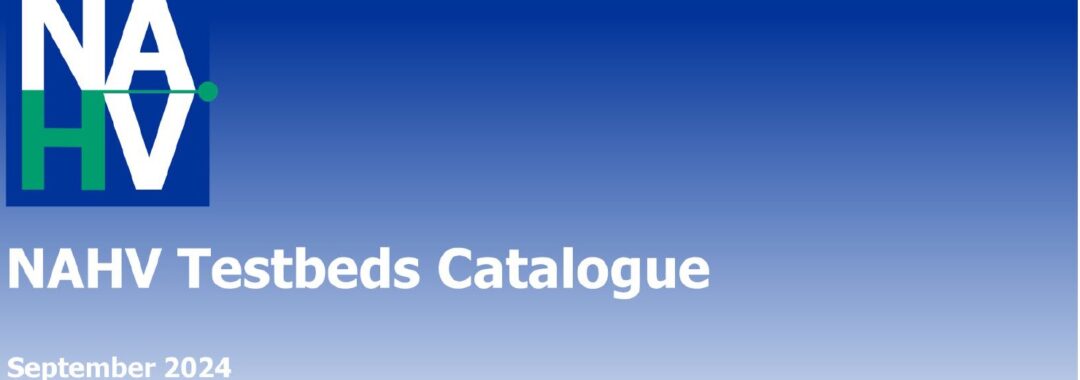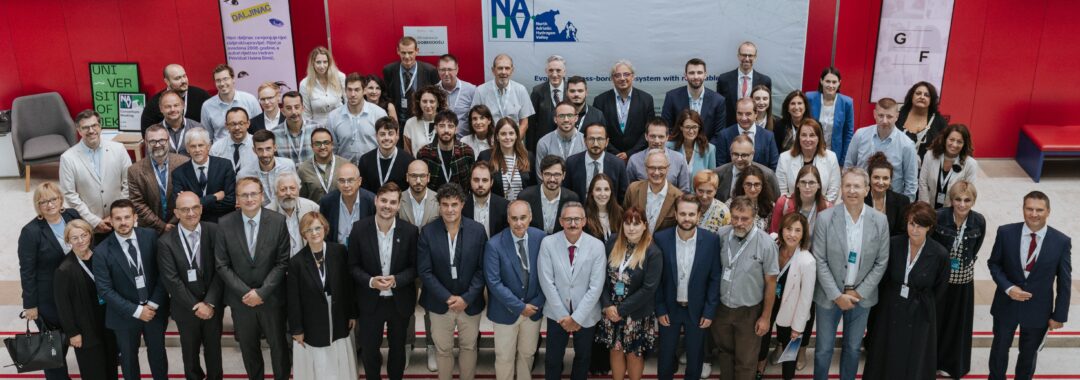Partners of the North Adriatic Hydrogen Valley (NAHV) have gathered in Rijeka at the annual Consortium meeting to review the implementation of key projects, assess risks along the way and focus on integration into their respective social and industrial environments.
NAHV is a transnational initiative funded through the Horizon Europe Programme comprising close to 100 delegates representing 37 project partners from three countries: Croatia, Friuli Venezia Giulia Autonomous Region of Italy, and Slovenia, who have gathered at the Faculty of Civil Engineering of the University of Rijeka at their annual Consortium meeting.
Prof. dr. Snježana Prijić-Samaržija, Rector, University of Rijeka hosting the event and dr. Jerneja Sedlar, NAHV Coordinator, Head of the Development and Investment Department of HSE opened the press conference moderated by Jurij Giacomelli of META Circularity, NAHV’s Communication and Dissemination Manager.
Alessia Rosolen Regional Councillor for Education of Friuli-Venezia Giulia Autonomous Region of Italy, Marin Gregorović, Mayor of the Municipality of Cres and Stephen Taylor, Strategic Coordinator of the NAHV Joint Working Group were other speakers at the press conference.
NAHV’s new partner: Municipality of Cres
The NAHV Consortium has welcomed a new partner at the meeting in Rijeka, the Municipality of Cres, committed to undertake the obligations from the outgoing partner ACI Marine, what will ensure the continuity of the NAHV actions without any frictions or delays.
“The Municipality of Cres joins the NAHV Consortium on the development of hydrogen infrastructure on the Cres-Lošinj archipelago, in partnership with ECUBES,” emphasized Jerneja Sedlar, NAHV Coordinator and the representative of the Lead partner, HSE. “This collaboration represents a significant step forward for our region.”
Industrial testbed projects creating possibilities for decarbonisation and renewable hydrogen uptake
Altogether, 17 industrial “testbed” projects are being developed in different locations in all three partner countries, supported by a number of cross-cutting actions. The implementation of this ambitious initiative aims to facilitate the uptake of hydrogen-related solutions and enable the actors of the emerging hydrogen ecosystem of the North Adriatic for autonomous production, transmission, storage and use of renewable hydrogen as well as for their further uptake in the future.
A smooth and synchronised implementation of the industrial testbeds along with other support initiatives is paramount to the overall success of the NAHV initiative. The Consortium presents for the first time a complete overview of 17 industrial pilot projects in a Testbeds Catalogue.
Education related activities address training of future professionals and experts in the field of hydrogen technologies
A number of education-related activities are being addressed to promote the training of future professionals and experts in the field of hydrogen technologies. These activities are coordinated by the University of Rijeka with the participation, respectively, of the Universities of Ljubljana and Trieste, and industrial partners GITONE ECUBES, META Group and META Circularity.
“Ensuring interdisciplinary education covering science, technology, engineering and mathematics as well as financial, and societal aspects of hydrogen technologies is in our scope, underlined Snježana Prijić-Samaržija, Rector of the University of Rijeka.
The Consortium has initiated the preparation of vocational training programmes with support from the Region FVG and the Slovenian and Croatian ministries, and other partners. It aims for the funding through the European Social Fund. The development of micro-credentials for reskilling and upskilling industry professionals is underway in collaboration among the involved universities.
Furthermore, in the area of education, the NAHV Consortium aims to establish a Macro-Regional Competence Centre for Hydrogen Research and Education led by GITONE and to enhance the Training and educational mentoring programme H2STUDENT led by ECUBES. The universities are engaged in the development of interdisciplinary and international prototypes for Bachelor, Master and Doctorate degrees. Special attention is dedicated to the alignment of education with gender equality policies. And to opening to professionals and universities beyond the NAHV target territories, especially in South-Eastern and Central European regions.
Hydrogen Ecosystem of the North Adriatic has been expanding thanks to a newly launched initiative North Adriatic Clean Hydrogen Investment Platform (NACHIP). A grant of 7.6 million euro has been awarded to the consortium of 12 partners from the three participating countries led by Jozef Stefan Institute from Ljubljana.
The initiative represents an opportunity for up to 18 SMEs who will be selected to receive a grant of up to 60.000 euro each and join the two-tier NACHIP acceleration programme through which they be integrated in the value chains evolving around the five industrial pilot projects centred on hydrogen-related technologies.
“Preparatory activities for the launch of the NAHV SPV, a non-profit association to be founded in under the Belgian law, are in progress and are led by Area Science Park,” reported by Stephen Taylor, Strategic Coordinator of the NAHV Joint Working Group, a governance body of the NAHV.
The aim of the NAHV SPV is to ensure long-term sustainability of the project results and their impacts beyond the life of the NAHV Horizon Europe initiative. Not less importantly, this structure which is going to include the NAHV partners as well as other interested stakeholders, can integrate other initiatives as well. One such initiative is already active, namely, the NACHIP. The project goals foresee an integration with the NAHV SPV at the end of its life.
For more information, please, contact:
Jurij Giacomelli, NAHV C&D Manager (jurij.giacomelli@meta-circularity.eu)
Or write to:
communication@nahv.eu .
You are welcome to visit the NAHV home page for more info on the initiative: www.nahv.eu.


